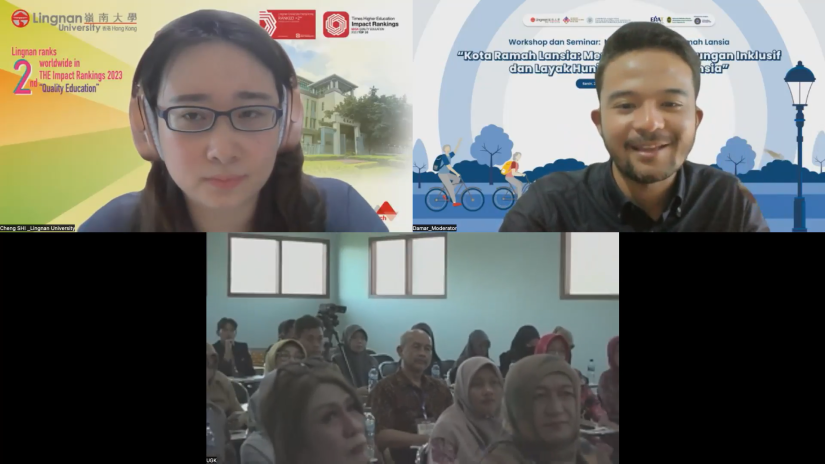
Yogyakarta, May 2nd 2024─Every country has its own population age cycle. Indonesia will experience a demographic bonus in 2030-2040. After that, the age of the old population will increase. This phase will make the country have to bear a greater burden than when the majority of the population was in productive age. To find out the right steps to handle this, the Department of Social Development and Welfare (PsDK) of FISIPOL UGM held a webinar entitled “Elderly Friendly Cities: Creating an Inclusive and Livable Environment for All Elderly” on Monday (29/4).
This webinar presented three main speakers, namely Prof. SHI Cheng, from Lingnan University; Tauchid Komara Yudha, MDP from the Department of Social Welfare and Development of FISIPOL UGM; and Sapta Widi Wusana, S.Psi., M.A from Elderly Rights Advocacy Treatment (ERAT). All three discussed this issue through different perspectives. Prof. SHI Cheng, explained how Hong Kong handles the increasing elderly population, which will even exceed Japan in 2050. “Old age will continue to be experienced by every country. There are many different opinions about this, because the productivity of the country will certainly decrease. But, actually, there is a good indication of the old population, where the Life Expectancy Rate (AHH) of a country is indicated to be long,” he explained.
Prof. SHI Cheng explained that the world will have to face a boom in old age by 2050. It is estimated that 1 in 6 people in the world will be 65 years old with a total of nearly 2 billion total world population. The phenomenon of an aging population is not only about the physical aging of some people, but also raises other issues. Older individuals are often associated with physical frailty, unattractive appearance, special needs, etc. These stereotypes lead to inequality and discrimination within certain groups.
“Aging is inevitable, but we can overcome the issue of old age. First of all, the stereotypes about older individuals must be corrected. Older people can be healthy, fashionable, and keep their spirits up. They can share their insights and knowledge with younger age groups,” Prof. SHI Cheng explained. Many individuals in the elderly group are still fit and healthy and able to do certain jobs or activities. Unfortunately, stereotypes about the elderly prevent them from getting these opportunities. This, of course, determines the productivity of a country. Although not as capable as the productive population, the elderly population can still support the productivity of a country.
The same thing was also conveyed by Sapta Widi Wusana, S.Psi., M.A regarding how society needs to change its perspective on the elderly. The readiness of a country can be judged by the perception of the elderly in the community itself. Other age groups need to understand that everyone will experience old age. When an individual is no longer able to move optimally, they will tend to depend on other individuals only to fulfill their own needs. “We as humans must understand that we are equal. The elderly may no longer be physically strong, it is not something that can be avoided, but can be realized. Supporting the elderly is supporting someone to become a whole human being,” he said.
In addition, the country’s readiness to welcome the old population also needs to be reviewed in terms of policy. Tauchid Komara Yudha, MDP explained that Indonesia does not yet have a mature policy to prepare for the old age population. Currently, health insurance does not fully guarantee the health and welfare of the elderly. Each individual still has to spend at least 40% of their personal pocket for health costs. When compared to the condition of the elderly where they can no longer actively work, this fact is considered worrying.
“For the elderly, working should be a right to choose. They can choose an activity to be productive, rather than just staying at home. But in Indonesia, the elderly working is a way to survive, not a choice,” said Yudha. He added that when an individual is no longer able to work productively, they should get welfare covered by the state. But in fact, only a small portion of the elderly group whose old age is covered by the state, while others still work to make ends meet.
The implementation of this webinar is one of the commitments of FISIPOL UGM to continue to educate and socialize the importance of sustainability. Especially in the 3rd Sustainable Development Goals (SDGs) point, namely health and welfare, every individual has the right to get both in full and guaranteed by the state. Hopefully, Indonesia will be able to increase welfare guarantees for non-productive people before 2050.
